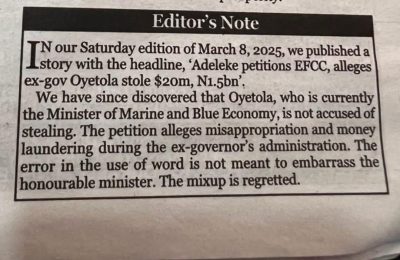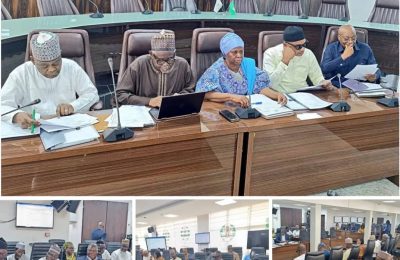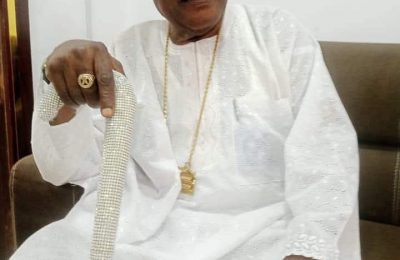
Former Minister of Communications and former Attorney General of Oyo State, Honourable Adebayo Shittu speaks with WALE AKINSELURE on budget padding as a recurring decimal and examines the President Bola Tinubu administration thus far.
Budget padding has become a recurring decimal with the legislature, especially the National Assembly. You have been part of the legislature as well as the executive, is budget padding so unavoidable in Nigeria?

Budget padding is not a new thing in relation to the legislature and the executive. I will be surprised if budget padding would occur in any state legislature because virtually all state legislatures in this country are under the armpit of state governors. They hardly have been able to liberate themselves. Before you can even become a member of a state legislature, you would probably have had the blessing of a governor who is referred to as the leader of the party in the state. So, they virtually dictate who gets the ticket of the party and who does not get the ticket of the party. To that extent, it will be very difficult for anybody in the legislature to do anything other than what governors dictate to them. But that scenario does not exist at the national level. At the national level, there is the diversity of the membership and quality of people at that level, particularly at the Senate. They are former governors and had held top political offices before, so they have acquired a lot of powers and can dictate to the executive. You also know that the fate of the executive, in terms of budget approval, implementation, monitoring, and others. I believe the current issue of alleged budget padding requires a lot of investigation. As a lawyer, I have learnt to see allegations as mere allegations subject to verification. Unfortunately in the current situation, I want to believe the suspension of Abdul Ningi on the basis of his allegation was rushed. If I were in the shoes of the President of the Senate, I would have first established an adhoc committee to probe into the allegations, give Abdul Ningi sufficient opportunity to stare his side of the story. The way his suspension was rushed will raise a lot of questions in the minds of the people, as if the Senate wants to cover up those allegations. I am no suggesting that Abdul Ningi must have been right in his allegations, but the Senate should have been cautious for the sake of the public who may be given the wrong signals as to what exactly is happening.
The channel for budget padding, over the years, is zonal intervention or constituency projects. What is your take on either?
Honestly, when the executive draws up a budget, are those projects in the budget not for one constituency or the other? In an ideal situation, we have an executive whose duty is to execute projects in all parts of the country, as much as possible. The job of the legislature is to legislate and supervise. The National Assembly is the sole authority on approval of budgets. If there are things they think their respective constituencies deserve, why create something different from what the executive is completely unaware of? It is an aberration in an ideal democracy. Let our legislators do thorough examination of budge proposals presented to them and leave the executive to execute as you have the power of supervising to ensure that whatever is approved is implemented. But, where you put yourself in a situation not only as legislators but also executors of projects which are never supervised by the executive whose duty is to implement budget, then, it raises questions. But, in Nigeria, we are in a very difficult situation where because you have an all-powerful Senate or National Assembly which though it has powers to supervise and approve proposals from the executive, it also goes over and above the responsibilities of the executive to also make independent proposals for projects which they themselves execute without anybody being able to supervise, no external body outside the National Assembly is in a position to supervise. Duplicating roles is not good enough for our democracy. Senators will continue to be in mould of being suspected as long as this situation continues.
Talking about duplicating roles, what is your stance on calls for unicameral legislature as against the current bicameral?
It is a very difficult question do answer. Where people are in the Senate or House of Representatives, they are Nigerians and the Nigerian factor is always at play. Whether you create a unicameral or bicameral legislature, what is important is for us to have people who are sufficiently focused and knowledgeable as to what their responsibilities to Nigeria should be, not responsibility to themselves or their small entities. It is the national interest that should be paramount. I don’t bother my head about the question because I know that it is only the National Assembly that can make a law to change the status quo, and I know nobody will make that law. People who are benefiting from the current situation, you won’t expect them to commit political suicide.
You campaigned for the emergence of the President Bola Tinubu administration. That government has foisted hardship on the land. Nigerians are hungry, suffering.
It’s unfortunate that Nigerians, including me, are suffering. I buy from the same market from Nigerians and I am not benefitting specially from the government of the day. But I want to face the reality and appreciate that the problems of today had their root in past administrations.
Past administrations which you were a part of?
Of course, I won’t deny that. You would recall that all we have been able to do with regards to our crude oil in Nigeria, for more than 10 years is the fact that we get crude oil from the soil, we export this crude oil overseas, paying in dollars for the transportation. We refine this crude oil overseas, paying in dollars. We bring the refined petroleum products back to Nigeria paying in dollars. Look at the additional cost of getting refined petroleum products, if you add cost of transportation and refining overseas. I recall in 2015 when we were campaigning for the President Muhammadu Buhari government, we promised that within the shortest possible time, we will be the four refineries back on stream. If we had succeeded in doing that, this subsidy which was recently removed would not have existed because if we were producing and refining crude oil locally, the cost of transportation to and fro would have been removed and the exorbitant cost of refining overseas would have been removed. So, the failure of our government to bring on stream any of the four refineries, which had gone comatose over the past 20 years, is the cause of the problems and sufferings we are having today. Under that atmosphere of foreign refining, Nigeria has had to be borrowing money to sustain the additional cost. For how long do you borrow money? You should be borrowing money for infrastructural development, education, health. But you’re borrowing for consumption of petroleum products, that is the greatest undoing of Nigeria as a nation. When Tinubu came, he felt there must be an end to postponing the evil day because when you borrow to an extent that you have to even be selling your crude oil in advance, it doesn’t make economic sense. If we continued in that trajectory, Nigeria could have collapsed alone the line. In order to bring about redemption in our system, the Tinubu administration had to gather all the courage to end oil subsidy. It is often said that Rome was not built in a day. What we are suffering now was caused by preceding governments. I am one with the president that we need a period of sacrifice as a nation so that we could be redeemed.
How long more is the period of sacrifice going to last?
I want to believe that within the next three or four months, things would improve. Within his period in office, we now have a promise that in two weeks time, Port Harcourt refinery will come on stream. By that, within the next two months, we would not need to import any petroleum product or go outside to refine. Once we get to that stage, petroleum products prices would collapse. The other thing is that Nigerians are greedy and opportunistic. The person who had stored rice two years ago is also selling now for N80,000. The farmer, under the cliche that things are expensive, also sells a tuber that should be N500 for N1,500. I want to see a Bola Tinubu presidency who in, another two, three months, would take very strong measures against profiteering and licentious increases in consumer goods. Once we are assured that we sufficiently localize refining of crude oil, we should also be able to sell to other West African countries whatever excess refining done. Apart from this issue of inability to refine locally, is also the issue our taste for foreign goods. Government has to be strict about this. Why is Nigeria not producing anything? Why is it all about importation? We should perhaps impose very high tariffs on importation of undesirable foreign goods in Nigeria. That perhaps will force Nigerians to look inwards, to start producing. We need to do something about the manufacturing sector in Nigeria. Electricity is also key in getting it right. South Africa with less than 50 million people produces more than four times the electricity that it requires. Why has it been difficult for us in Nigeria to produce sufficient electricity?
In alleviating the present hardship, we sometimes have the central and subnational governments shift responsibilities to one another.
Nigeria is a federation not a unitary government. This means we have different governments at different levels. We have the federal government whose duty ordinarily should be to coordinate a number of things like foreign affairs, currency, security. The main job should be that of the subnationals particularly the states who mostly get money they have not worked for every month and the level of corruption at the subnational is something else. Unfortunately, the state houses of assembly which should come to the rescue and be the mouthpieces of the local people are not effective enough to do what they are supposed to do. So, why blaming governments at the state level, we must also blame the House of Assembly who find it difficult to abandon the role of apron string of the state executive. During Chief Obafemi Awolowo›s time, it was the subnational government and there was no petroleum money coming in and he was able to effectively implement free and compulsory education, free health services, integrated infrastructural development and provision of jobs. He did this for almost 10 years. Why are our state governments not replicating this when apart from potential resources at subnational level, they are also getting oil money. For instance, Oyo State is not an oil producing state yet every month, it collects billions of naira, what are these monies used for? We should be asking questions and we should be taking our legislators to account. If we cannot reach the governors who are in their own ivory tower, we should be able to talk to those legislators we elected to do something. For me, the takeoff point is full implementation of the policy on free education and free health services. Once we do that, other things will fall in place. People will have a sense that they have a government which caters for their needs. They should also create jobs. People who have ideas can eliminate graduate unemployment. Awolowo did it. Some of us who learnt politics at the feet of Awolowo have these ideas and can be implemented at the subnational level. If every subnational government does this, there will be less for the federal government to do. But merely sitting and waiting for the end of the month for monies which we find difficult to apply to the best interest of our people is most uncharitable and condemnable.
READ ALSO: 8th day Fidau prayers for late Olubadan, Oba Balogun, holds Friday








